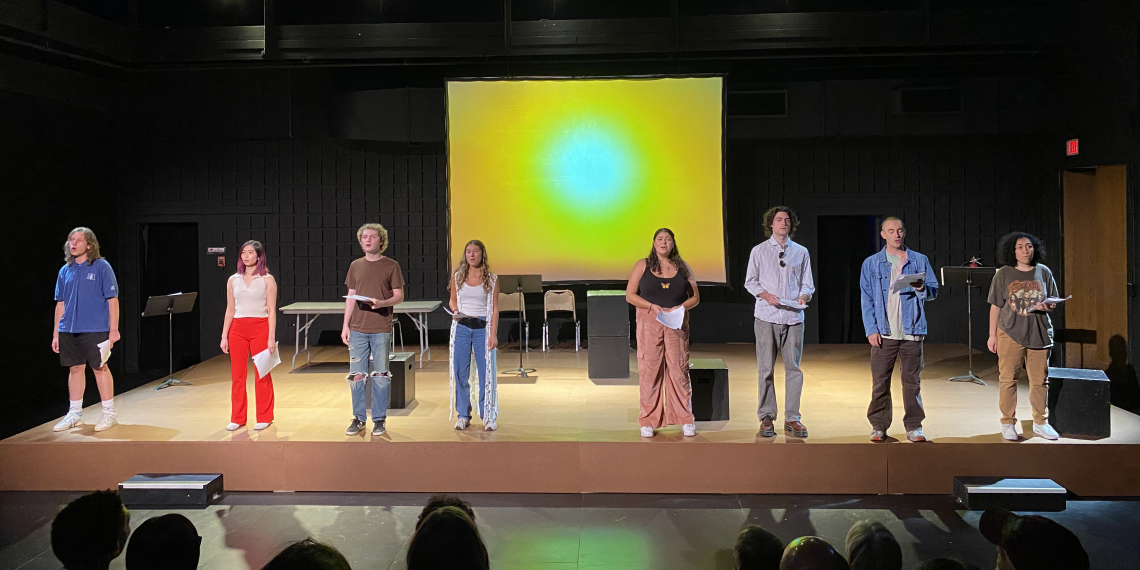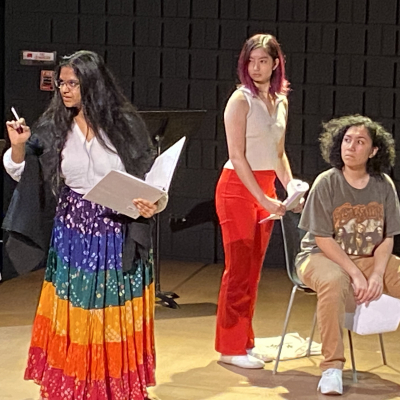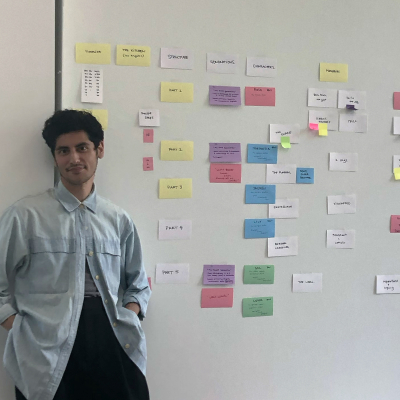
New Works Lab Brings Theater Professionals and Students Together
A personal connection with one of the iconic folk rock groups of the 1960s piqued Ken Cerniglia’s interest when he was approached to co-write a stage adaptation of Michael Walker’s book, “Laurel Canyon: The Inside Story of Rock-and-Roll's Legendary Neighborhood.”
“I grew up in LA — not in Laurel Canyon — but very near in the San Fernando Valley,” he said. “I grew up with The Mamas & the Papas. My parents had their records, and we listened to them all the time.”
Walker’s book is “like the Bible of Laurel Canyon,” Cerniglia explained. The neighborhood in the Hollywood Hills was a magnet for musicians in the 1960s and 70s, and the sounds created there still resonate today. Cerniglia and Walker worked together to write “Laurel Canyon: The Musical,” which they shared with the Duke community on September 20 in a staged reading featuring student actors.
Cerniglia, Walker and director Kristin Hanggi had been at Duke for two weeks as artists in residence in the Department of Theater Studies’ professional incubator, the New Works Lab. Each semester, the New Works Lab brings Duke students and theater professionals together to work on a project in development, such as “Laurel Canyon: The Musical.”
"The purpose of these labs is twofold,” said R. Darren Gobert, William and Sue Gross Professor and chair of the Department of Theater Studies.
“First, they insert students directly into the theater industry, giving them intensive exposure to top-caliber artists working on their current projects. Second, they solidify faculty’s connections to artists whose work we admire. By supporting those artist's projects, we help shape the future of theater in the U.S."
Cerniglia’s career as a dramaturg — an “editor for theater,” as he puts it — is both prolific and illustrious. It includes “Hadestown,” which won eight Tony Awards, and “Peter and the Starcatcher,” which garnered five. For 16 years, he was resident dramaturg and literary manager for Disney Theatrical Productions, developing over 70 titles for the stage.
Despite regularly working with professional actors, Cerniglia believes there’s a lot to learn from workshopping “Laurel Canyon” with Duke students. The musical centers on a group of 20-something musicians who go on a pilgrimage to Laurel Canyon, where the past starts to blend with the present. All but one of the characters in the musical, the elderly Naomi, are the same age as the student actors.
“It’s a great opportunity to come to Duke and work with young actors who are close to the age of the characters, and see how they connect with them,” Cerniglia said. “We're interested in the intergenerational appeal of this piece. It's not just for people who were young in the ‘60s and ‘70s, but also people who came after and still connect to this music.
“There are some similarities, politically, between the late ‘60s-early ‘70s and now. The questions we're asking about the world are very much questions of our time.”
Nathan Sinclair, a senior majoring in Theater Studies and Neuroscience, is a veteran of the department’s productions, but still felt he learned a lot from the opportunity to interact with Cerniglia. “I’ve never done such a short-notice performance before,” he said. “It was great working with Ken. He was just so encouraging.”
Theater Studies and Mathematics major Khiyali Pillalamarri was excited to participate in the creation of a new theater work. “I'm really glad Ken, Kristin and Michael came here and gave us the opportunity to work with them, learn from them about how theater gets made — how the adaptation process goes.”
Cerniglia is working with a producer to bring “Laurel Canyon: The Musical” to the stage in London or New York. Many of the pieces developed in Theater Studies’ New Works Labs over the years have gone on to successful runs in theaters across the country. Benjamin Benne’s “Fantasma,” workshopped at Duke in Fall 2021, is a case in point.
Benne was a young playwright pursuing an MFA at Yale University when he had the opportunity to be an artist in residence at Duke and develop a piece for the New Works Lab. “I had just received a commission from South Coast Repertory in Orange County, California,” he said.
With his collaborator, director Cat Rodríguez, Benne used the time at Duke to begin work on “Fantasma,” a play that examines his family history of immigration from Guatemala and their experiences adjusting to life in the United States.
“I wrote the first 30 pages of the play during that residency,” Benne recalled. “That's what we shared with the students at the end of our time at Duke. Then I finished writing the play and submitted it to South Coast Repertory. They were so excited about it that they immediately wanted to do a workshop!”
“Fantasma” received another workshop at The Public Theater in New York, then was selected to be part of the main season at the Playwrights’ Center in Minneapolis last spring, where it received two performances.
“We're finally ready for my agents to start sending it out to places to consider for further development or hopefully a production,” Benne said.
He remembers his artist residency at Duke as “a gift.”
“I had some fantastic exchanges with the students. Cat and I got to talk to them about their work and what they were thinking about in terms of their career trajectories,” he said. “The New Works Lab residency was really fulfilling on many levels, not just writing my own play, but also getting to interface with students and talk to them about what a career in the theater looks like.”
Stay connected to Duke Theater Studies and read more stories like this. Sign up for our monthly newsletter.




